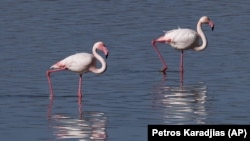Animal activists in Cyprus are asking officials to expand a hunting ban throughout a group of salt lakes near the coast. They are worried that migrating flamingos could possibly eat deadly amounts of lead shotgun pellets.
A flamingo is a large bird, usually bright pink or orange, that often walks along the water line in coastal areas.
Martin Hellicar is director of Birdlife Cyprus. He said flamingos are at risk of eating the small pellets that lie on the edge of the water as they feed.
“Last year, we had tens of losses of flamingos,” Hellicar said.
Cyprus is an important stop on the migration path for many kinds of birds flying from Africa to Europe. The Larnaca Salt Lake is a wetlands area of four lakes. As many as 15,000 flamingos from colder climates arrive on the southern coast of the island nation in the eastern Mediterranean. They stay through the winter and leave in March.
Hunting is banned around most of the Larnaca Salt Lake. But hunters are still permitted to shoot ducks in the area’s southern end.
The government’s Game and Fauna Service says in the first two months of 2020, 96 flamingos were found dead in the Larnaca Salt Lake wetlands as a result of lead poisoning.
Panayiotis Constantinou is an official with Cyprus Veterinary Services. He has examined the dead birds and confirmed that they were poisoned by lead.
The amount of lead pellets increased two years ago, after a heavy rain caused many to come up from the ground around the lake.
A sport shooting range near the lake’s northern end closed nearly 18 years ago. Officials then organized a clean-up of lead pellets in the area. But Hellicar says the clean-up was not effective.
The European Union paid for an investigation to identify where large amounts of lead pellets remain so they can be removed.
Early results show “very high” lead levels in the wetlands’ southern tip. Continued duck hunting there could make the problem worse, Hellicar said.
“The danger is real for the flamingos and other birds that use the area,” he said.
Cyprus Hunting Federation official Alexandros Loizides disagrees. He says that hunting in a 200-meter area is not a problem due to the small number of hunters. He said chemicals used by nearby farms are creating a pollution problem that hurts the birds.
“I think the effect of hunting there is very small on the specific part of the lake,” said Loizides. “It’d be a shame for hunters to lose the only area where hunting is permitted near wetlands,” he added.
A ban on the use of lead pellets near wetlands has been in force in Cyprus for several years. A similar ban throughout the EU took effect last month. But some say the laws are not being enforced enough.
Pantelis Hadjiyeros is head of the Game and Fauna Service. He said it is less important to ban hunting in the area and more important to urge hunters to stop using weapons with lead pellets.
People need to know and accept “that the use of lead pellets is prohibited near wetlands and that only steel pellets are permitted,” Hadjiyeros said.
I’m Susan Shand.
The Associated Press reported on this story. Susan Shand adapted it for VOA Learning English. Ashley Thompson was the editor.
_______________________________________________________________
Words in This Story
We want to hear from you. Write to us in the Comments Section.
pellet – n. a small metal object that is shot from a gun
fauna – n. all the animals that live in a particular area, time period, or environment
shame – n.a feeling of guilt, regret, or sadness that you have because you know you have done something wrong
specific – adj. special or particular
prohibit – v. to order someone not to use or do something





